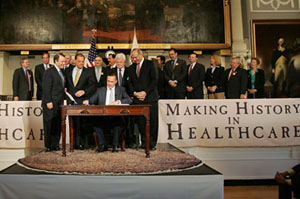Across the national airwaves and on the Republican campaign trail, the Massachusetts health law that many now call “Romneycare” is routinely trashed. Here’s Texas Governor Rick Perry in a debate last October.

Former Mass. Gov. Mitt Romney signs his state’s health care reform bill into law in April 2006. (Photo by Joe Raedle/Getty Images)
“Romneycare has driven the cost of small business insurance premiums up by 14 percent over the national average in Massachusetts.” And from former Senator Rick Santorum last month we heard, “it (Romneycare) was the basis of Obamacare and it was an abject failure.”
So you might think this drubbing would rub off on Massachusetts residents, about two-thirds of whom have consistently endorsed the state’s coverage plan since it passed in 2006. Not so.
In the latest WBUR poll, 62 percent support the law and 33 percent oppose it. Steve Koczela is president of the Mass, Inc. polling group, which conducted the poll.
“Even with all the attention the Massachusetts law has gotten nationally,” said Koczela, “it really hasn’t driven down support among voters here in Massachusetts.”
The difference between national and local opinions about the law is part politics, part misinformation, and partly a difference of experience, says Robert Blendon, a professor at Harvard Kennedy School. Massachusetts residents are living with the law. Opinions outside the state are based on speculation.
“A substantial share of Americans believe that the national law will fail and they assume that the Massachusetts law, which in their minds is related to this, is not working well either,” Blendon said.
That’s the case, said Blendon, even when he presents evidence to audiences outside Massachusetts that a strong majority of residents in the Commonwealth are happy with the state law.
“People are convinced,” laughed Blendon, that “[the poll] can’t be right.”
In Massachusetts, most residents in the WBUR poll (68 percent), see former Governor Mitt Romney’s opposition to the national law as an effort to win votes in his presidential campaign. Only 25% see his opposition as a disagreement based on principle.
“Taking that, in concert with the level of influence people thought the state law had on the national law, at least suggests there’s some difficulty distancing yourself from what happened nationally to what happened here at home,” says pollster Koczela.
That dynamic may translate into problems for Republican Sen. Scott Brown, who, like Romney, supports the state law but hopes to repeal the national law.
Robert D’Ambrosio is one of the WBUR poll respondents who said he likes the state health care law and is not sure whom he supports in the Senate race. D’Ambrosio finds Brown’s position confusing.
“I don’t understand why he doesn’t bother the same with the national as he does with the state,” says D’Ambrosio, who lives in Malden, a suburb just north of Boston. “If you like one, how can you not like the other?”
Many residents polled say they want to know how Brown and the leading Democratic contender Elizabeth Warren would control health care costs. Paula Zindler from Cummington in western Massachusetts, is another undecided voter. She says the state law, which both Brown and Warren support, has forced up the cost of her health coverage.
“We had to switch to a different carrier, because my insurance, I was told, was inadequate,” explains Zindler. “So I either had to change my insurance or pay a fine, and I’m not happy with that.”
While health care is expected to be a key issue in the U.S. Senate race in Massachusetts, there are at least two major, yet to be determined, factors that will shape this debate. One is whether the US Supreme Court will let all or part of the federal Affordable Care Act stand. Two is who the Republican presidential nominee will be. But health care will also play into the standard practice of US political races, says Professor Blendon.
“Even though they (Brown and Warren) have a truce on how each side will describe each other, there will be an effort to put one far on the left and one far on the right and health care examples will be very prominent in that effort,” explains Blendon.
By “truce,” Blendon refers to the agreement Warren and Brown reached a few weeks ago to donate half the cost of any political ad funded by an outside organization to charity. Several residents in the WBUR poll praise this deal and say watching whether it holds will be one of the most interesting parts of this year’s Senate race.






